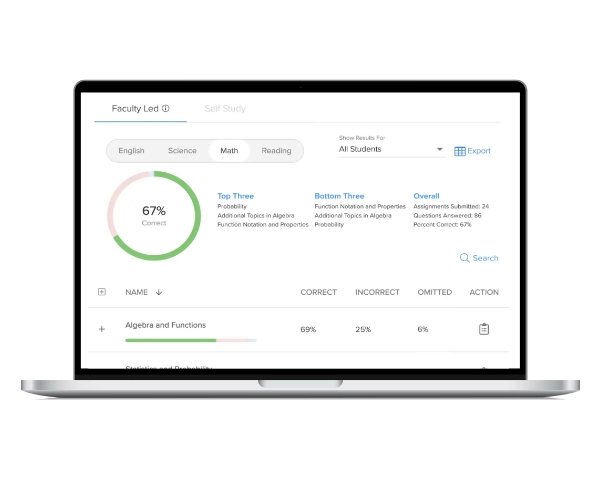The two FNP certification exams you can choose to take have a few key differences to note when pursuing your license. They are regulated by the American Academy of Nurse Practitioners (AANP) and American Nurses Credentialing Center (ANCC). Let’s look at each exam blueprint to identify differences in the material and eliminate surprises on test day.
AANP FNP Exam Blueprint
The AANP FNP exam has 150 multiple-choice questions, with 135 counting toward your score and 15 as pretest questions. In the blueprint, you can see approximately how many questions per topic to expect on your exam — sorted by domains and patient age:
| Domain/Task | # of Items | % of Items |
|---|---|---|
| Domain 1: Assess | 43 | 32% |
| Domain 2: Diagnose | 36 | 26.5% |
| Domain 3: Plan | 36 | 26.5% |
| Domain 4: Evaluate | 20 | 15% |
| Total | 135 | 100% |
| Patient Age | # of Items | % of Items |
|---|---|---|
| Newborn | 3 | 2% |
| Infant | 4 | 3% |
| Toddler | 5 | 4% |
| Child | 6 | 4% |
| Adolescent* | 12 | 9% |
| Young Adult* | 30 | 22% |
| Middle Adult* | 35 | 26% |
| Older Adult | 40 | 30% |
| Total | 135 | 100% |
*Includes Prenatal.
**Age parameters are not defined for any population. The AANP uses growth and development when constructing the FNP certification exam.
FNP Domains and Tasks
- Assess
- Obtain elements of subjective patient information (e.g., chief complaint, history, and review of systems).
- Perform appropriate physical examination (e.g., focused and complete).
- Order, perform, and interpret screening and diagnostic tests.
- Diagnose
- Synthesize and analyze subjective and objective information to develop differential diagnoses.
- Prioritize differential diagnoses and establish a primary diagnosis.
- Plan
- Establish a patient-centered, evidence-based plan of care.
- Initiate interprofessional referrals or consultations.
- Prescribe, order, or administer pharmacologic and non-pharmacologic treatments.
- Provide education, counseling, and health promotion strategies.
- Evaluate
- Evaluate the effectiveness of the plan of care.
- Monitor and modify the plan of care based on patient outcomes.
FNP Knowledge Areas
- Diagnostic and therapeutic tests
- Specialized assessments (e.g., developmental, functional, and psychological)
- Health history
- Physical examination
- Anatomy
- Physiology
- Pathophysiology
- Co-morbidities
- Pharmacologic
- Non-pharmacologic
- Integrative
- Crisis management
- Diagnostic reasoning
- Health promotion, harm reduction, and disease prevention
- Healthcare economics (e.g., cost and billing)
- Interprofessional practice
- Legal and ethical issues
- Patient and family education and counseling
- Principles of epidemiology, population health, and social drivers of health (SDoH)
- Procedures
- Transitions of care
- Cultural responsiveness
- Therapeutic communication
- Pain management
ANCC FNP-BC Test Content Outline
The ANCC FNP exam has 175 questions, with 150 counting toward your score and 25 as pretest questions. In the content outline, you can see approximately how many questions per topic to expect on your exam — sorted by domains. There are also secondary classifications to consider.
| Domain | # of Questions | Percentage* |
|---|---|---|
| Domain 1: Assessment | 29 | 19% |
| Domain 2: Diagnosis | 26 | 17% |
| Domain 3: Planning | 29 | 19% |
| Domain 4: Implementation | 43 | 29% |
| Domain 5: Evaluation | 23 | 15% |
| Total | 150 | 100% |
*The percentages do not add to 100% because of rounding.
FNP-BC Domains
- Assessment
- Knowledge
- Evidence-based population health promotion and screening
- Skill
- Comprehensive history and physical assessment
- Focused history and physical assessment
- Functional assessment (e.g., cognitive, developmental, physical capacity, and family and caregiver roles)
- Risk assessment (e.g., genetic, behavioral, lifestyle, and cultural)
- Diagnosis
- Knowledge
- Pathogenesis and clinical manifestations of disease states
- Skill
- Diagnostic test selection
- Differentiating between normal and abnormal physiologic changes
- Formulating differential diagnoses
- Planning
- Knowledge
- Age-appropriate primary, secondary, and tertiary prevention
- Anticipatory guidance (e.g., developmental, behavioral, disease progression, crisis management, and end-of-life care)
- Evidence-based clinical guidelines and standards of care
- Pharmacotherapeutics, pharmacokinetics, pharmacodynamics, and pharmacogenetics
- Skill
- Culturally sensitive practice
- Research appraisal (e.g., design, results, and clinical applicability)
- Implementation
- Knowledge
- Legal and ethical implementations for healthcare and technology (e.g., HIPAA, confidentiality, and accessibility)
- Non-pharmacologic intervention and treatment selection (e.g., procedures, splinting, biopsies, sutures, and imaging)
- Pharmacotherapeutic intervention selection (e.g., interactions and contraindications)
- Regulatory guidelines (e.g., reportable diseases and abuse reporting)
- Scope and Standards for Advanced Practice Registered Nurses
- Skill
- Comprehensive documentation
- Patient-specific education
- Resource management (e.g., accessibility, coordination, and cost-effectiveness)
- Therapeutic communication (e.g., motivational interviewing and shared decision making)
- Evaluation
- Knowledge
- Ethical and legal principles and issues for patients, populations, and systems (e.g., justice, consent, guardianship, and bioethics)
- Non-pharmacologic intervention and treatment outcomes
- Pharmacotherapeutic intervention and treatment outcomes (e.g., monitoring, side/adverse effects, and patient outcomes)
- Skill
- Test results evaluation, management, and reporting
FNP-BC Secondary Classifications
- Cardiovascular
- Endocrine
- Gastrointestinal
- Genitourinary and Renal
- Head, Eyes, Ears, Nose, and Throat
- Hematopoietic*
- Immune*
- Integumentary
- Musculoskeletal
- Neurological
- Psychiatric
- Reproductive
- Respiratory
*Less emphasis compared to other body systems.
- Analgesic
- Anti-Infective
- Cardiovascular
- Endocrine
- Eye, Ear, Nose, and Skin
- Gastrointestinal
- Genitourologic
- Musculoskeletal
- Neurological
- Psychiatric
- Reproductive
- Respiratory
- Infant
- Preschool
- School-Age
- Adolescent
- Young Adult (including late adolescent and emancipated minors)/li>
- Adult
- Older Adult
- Frail Elderly
FNP Exam Content: AANP vs. ANCC
The AANP and ANCC FNP exams test essential clinical skills, but the ANCC’s Implementation domain emphasizes legal and regulatory considerations and other professional concepts. The ANCC’s broader scope suits leadership roles, while the AANP’s practice-focus aligns with patient care.
Check out our FNP Study Guide for expert advice on how to prepare for your exam.
Read More About the FNP
Explore an overview of both AANP and ANCC exams, including key differences in structure, content focus, and test format to help guide your certification decision.
Get expert prep strategies, topic breakdowns, and practice tips tailored to the FNP exam so you can study smarter and feel confident on test day.
FNP Registration, Cost and Eligibility Page
Find detailed steps to register, understand eligibility requirements, and review associated fees for both AANP and ANCC certification exams.
Learn how the FNP exams are scored, what counts toward your result, and how to interpret your performance for both AANP and ANCC formats.






